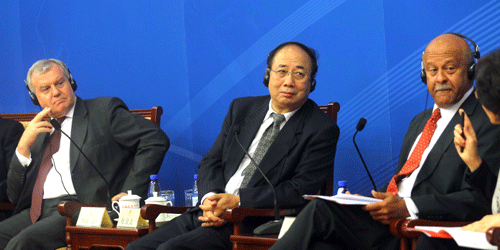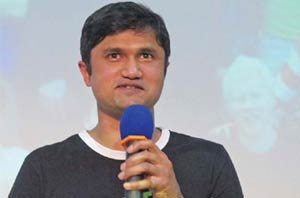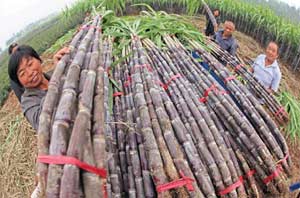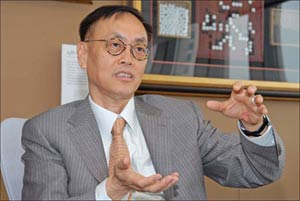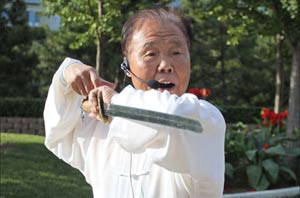Experts call on China to step up public diplomacy efforts
Updated: 2011-10-13 08:07
By Wu Jiao (China Daily)
|
|||||||||
|
Zhao Qizheng (center), chairman of the Foreign Affairs Commission of the 11th National Committee of the Chinese People's Political Consultative Conference, Alistair M. Michie (left), honorary secretary of the 48 Group Club of Britain and Ernest J. Wilson III, dean of Annenberg School for Communication and Journalism at the University of Southern California, attend a forum on "Public Diplomacy in the Age of Globalization" in Beijing on Wednesday. Zou Hong / China Daily |
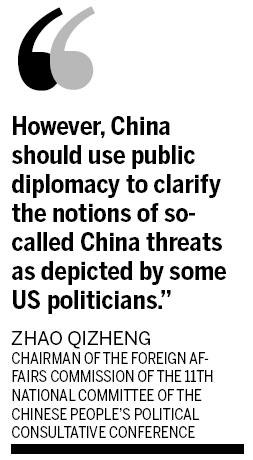 |
Nation needs to get message across to stop victimization
BEIJING - Worldwide political uncertainties and economic weakness might increase the chances of China being targeted by politicians in some countries, public diplomacy experts warned on Wednesday.
Attending a forum on "Public Diplomacy in the Age of Globalization", Alistair M. Michie, honorary secretary of the 48 Group Club of Britain, said that the urgent need for China to boost public diplomacy comes from the financial crisis in Europe and the United States.
"The economic weakness of Europe and the United States greatly increases the risk that their populations will take a negative view of China as they struggle with unemployment and economic austerity," said Michie from the British independent business network.
The 48 Group Club was formed by business people in the 1950s who were the first Westerners to establish trade relations with the newly formed People's Republic of China.
Some Western politicians have been blaming China for cheap exports which take jobs away from their domestic employers.
Ernest J. Wilson III, dean of Annenberg School for Communication and Journalism at the University of Southern California, said that as the US will hold presidential and congressional elections next year, China-US relations have already become an important issue for both the Democrats and Republicans.
"They are already playing the China card," Wilson said.
In the latest case, the US Senate passed the Currency Exchange Rate Oversight Reform Act on Tuesday.
The bill is especially directed at China's currency, which it claims is undervalued in order to make Chinese exports to the US cheaper.
Michie warned that during the election season there will be considerable maneuvering and politicking as some politicians will be tempted to demonize other countries.
There are also points of friction in China-US relations which may accelerate next year, against the global backdrop of potential flashpoints resulting from difficulties in Europe and elsewhere, said Michie.
Zhao Qizheng, chairman of the Foreign Affairs Commission of the 11th National Committee of the Chinese People's Political Consultative Conference, who also attended the forum, noted the possibility of some US politicians playing the China card to win votes.
"However, China should use public diplomacy to clarify the notions of so-called China threats as depicted by some US politicians," said Zhao, a top political adviser in China.
Meanwhile, Michie warned that many Chinese companies lack the ability to adequately get their message across in the global marketplace.
"China has a great story to tell, but polls show the message is just not getting across", said Michie, warning that China has become greatly dependent on foreign public relations groups.
In 2011, there is strong evidence that the six major foreign public relations groups tightened their grip on the sector in China by buying Chinese public relations companies, according to Michie.
Research shows that there are only two Chinese-controlled public relations companies with global reach, said Michie.
This means China is on a dangerous trend in global economic and commercial communication, and it does not make strategic sense for China to depend on foreigners to communicate internationally, said Michie, calling on China to speed its investment in public diplomacy.
Zhao said earlier that judging from the money China spends and what it has already done, its public diplomacy is in a very early phase.
But the small increase in China's input into its "soft power" building has already raised concerns in some other countries.
US Senator Richard Lugar of Indiana, the top Republican on the Senate Foreign Relations Committee, submitted a report in February urging the Barack Obama administration to improve its public diplomacy as the US was lagging behind China in building its "soft power".
Wilson from the US suggested China to advance its public diplomacy to the US.
He suggested short-term actions such as arranging more visits for university and media staff from each country, and long-term actions such as encouraging people to go to the other country and learn about its people.
"Ultimately, I am very optimistic. I have been coming to China for 20 years, and I am just beginning to understand a little bit about your rich history and culture, and I am thirsty to learn much more," said Wilson.
